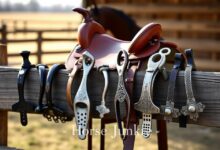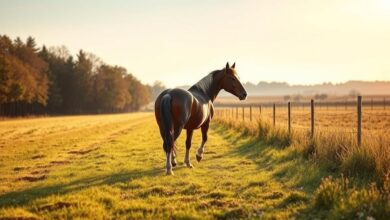Best Trail Horse Breeds for Your Outdoor Adventure
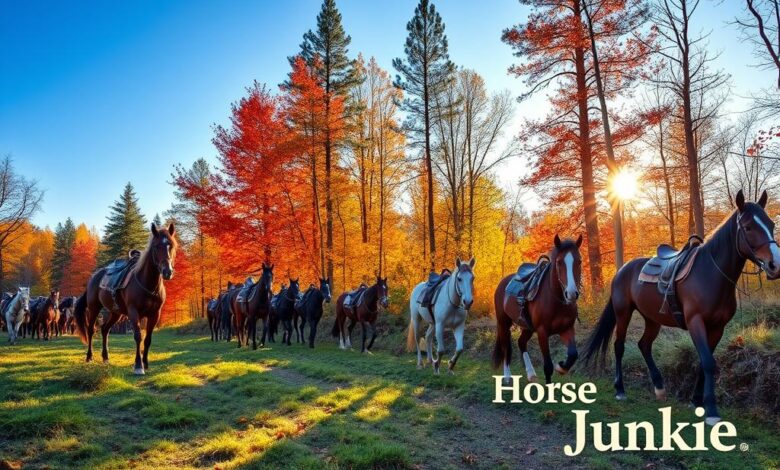
Ever thought about what makes a trail horse truly *exceptional*? Choosing the right trail horse is key for outdoor adventures. A great trail horse keeps us safe, comfortable, and company on our journey. We’ll look at the best trail horse breeds for various terrains and conditions.
From the versatile Quarter Horse to the smooth-gaited Tennessee Walking Horse, we’ll explore what makes them stand out. We’ll help you find the perfect horse for your outdoor adventures.
Key Takeaways
- Understanding the importance of selecting suitable trail horse breeds.
- Exploring popular options such as Quarter Horses and Tennessee Walking Horses.
- Identifying ideal traits for a safe and enjoyable trail riding experience.
- Considering breed versatility for different riding disciplines.
- Acknowledging the significance of temperament and adaptability in trail horses.
Why Choosing the Right Trail Horse is Important
Choosing the right trail horse is key for fun and safety on our outdoor trips. We need to think about what we need to find the perfect horse. The horse’s mood and how well it adapts are very important for our ride.
Understanding Our Needs for Trail Riding
Our trail riding needs can differ a lot. It’s important to decide if we want a horse that leads, follows, or goes its own way. A patient horse is a must. They should stay calm when things surprise them.
It’s good if a horse is okay with new things and water from different places. How well a horse gets along with others is also important. This makes our rides more fun.
Factors to Consider for Trail Horse Selection
There are many things to think about when picking a trail horse:
- Spookiness level: About 80% of riders think this is very important.
- Comfortable gaits: Around 65% like horses that are easy to ride for a long time.
- Ground manners: For 70%, how well a horse behaves on the ground is crucial for safety.
- Level of training: Nearly 75% look for horses that are well-trained and reliable.
- Health condition: A big deal for 70% of riders, as the horse’s health matters a lot.
- Age: About 50% prefer older horses for their experience.
- Personality traits: Valued by around 60%, these traits help us connect with the horse.
- Appearance and conformation: About 55% consider these when choosing a horse.
- Horse size: Important for 45%, the size should fit the planned use.
Top Breeds for Trail Riding in the U.S.
Choosing the right horse breed can make our trail rides better. We look for breeds that fit different trail conditions. Let’s check out some top trail horse breeds in the U.S. and why they’re great for various riders.
American Quarter Horse: A Popular Choice
The American Quarter Horse is a top pick for trail riding in the U.S. It’s versatile and friendly, perfect for all riders. These horses are 14 to 16 hands tall and start at about $3,000. They’re agile and calm, great for both new and seasoned riders.
Tennessee Walking Horse: Comfort and Smooth Gaits
The Tennessee Walking Horse is another favorite for trails. They’re 15.2 hands tall and known for their smooth rides. Their running walk lets riders go longer without getting tired. They’re steady and responsive, making them highly recommended.
Appaloosa: Adventure and Unique Looks
The Appaloosa is loved for its beautiful patterns and friendly nature. They’re a bit taller than Quarter Horses, standing at 15.1 to 15.3 hands. They’re perfect for those who want a unique trail ride with a reliable horse.
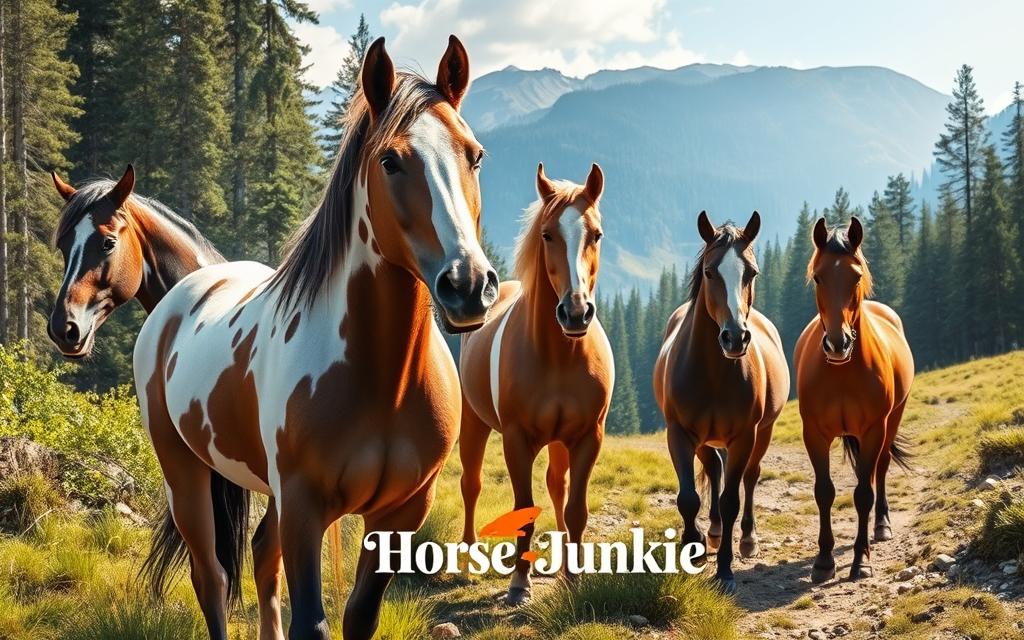
Characteristics of an Ideal Trail Horse
Choosing the right trail horse is key to a great adventure. We need a horse that can handle different terrains well. The right mix of temperament, trainability, size, and build makes a perfect trail partner.
Temperament and Trainability
A horse’s temperament and trainability are crucial. A calm and patient horse makes riding fun and safe. Look for horses that are:
- Calm demeanor: Horses that don’t spook easily are reassuring on tough trails.
- Willingness to learn: Horses that love to learn make riding better.
- Steadiness under pressure: They should be confident in facing obstacles like water and mud.
Horses with real trail experience are usually more reliable and fun. Geldings are often preferred for their steady temperaments, unlike stallions.
Size and Build Considerations
Size matters a lot for trail horses. They should be strong but also easy to control. Important factors include:
- Height: Horses between 14.2 and 16.2 hands are best, offering control and comfort.
- Build: A strong and sturdy body helps carry us safely over long distances.
- Agility: They should be agile to handle tricky paths and respond to our commands.
The ideal trail horse is easy to handle and calm when tied. These traits make our rides smooth and enjoyable, letting us enjoy the trails fully.
Breed Comparisons: Strengths and Weaknesses
Choosing the right trail horse is crucial. We need to know the strengths and weaknesses of different breeds. This knowledge helps us make the best choice for our adventures.
American Mustang: Resilient and Hardy
The American Mustang is known for its toughness and ability to handle rough terrains. These horses have a strong heritage that gives them great endurance. They are alert and make excellent companions in tough environments, doing well in many trail conditions.
Arabian Horse: Endurance and Stamina
Arabian horses are famous for their endurance and stamina, ideal for long rides. Their history shows they can cover vast distances. Their athletic build helps them last longer during rides.
Gy-p-sy Vanner: Affectionate and Family-friendly
The Gy-p-sy Vanner is known for its gentle nature, making it great for families. This breed is strong and friendly, perfect for both riding and bonding with family. Their calm nature makes them easy to handle and fun on trails.
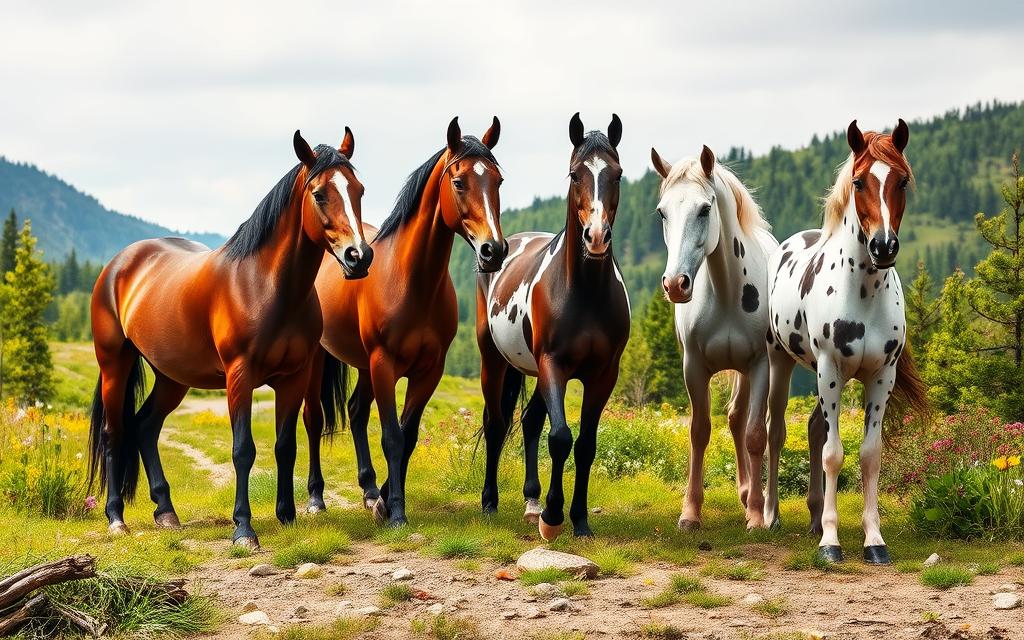
Regional Considerations in Trail Riding Breeds
Choosing the right trail horse means knowing the terrain. Each area has its own challenges. This helps pick the best horse for the region, making rides safer and more fun.
Breeds Best for the Rocky Mountains
In the Rocky Mountains, we need horses that can handle tough trails. The American Quarter Horse is perfect because it’s sure-footed and smart. It can easily handle rocky paths and saves energy for tough moments.
Its ability to adapt to the harsh environment makes it a top choice for this area.
Ideal Traits for Desert Trails
Desert trails need horses that do well in dry, hot conditions. The Arabian horse is great for these areas because it has lots of stamina and knows how to stay hydrated. Its light build helps it move quickly over sandy ground.
Arabians are built for desert adventures, making them a top pick for these trails.
Coastal Riding Preferences
Coastal areas have their own challenges, like sandy ground and humidity. Tennessee Walkers are perfect for these conditions. They have a smooth ride that doesn’t tire riders out.
They’re also friendly, making them great for riders of all ages. Their ability to handle humid weather and different terrains makes them a favorite for coastal rides.
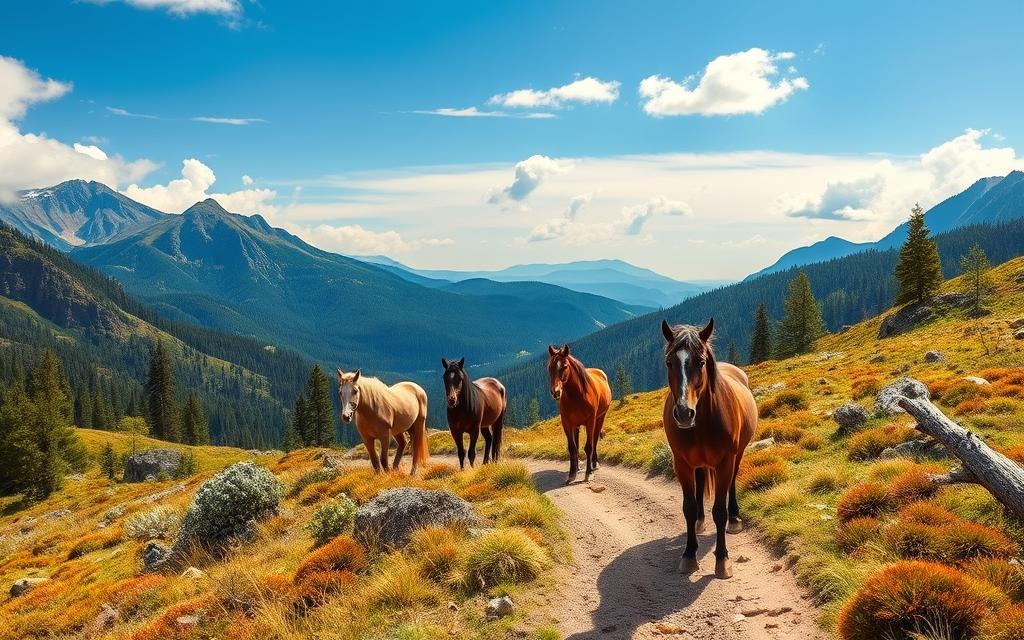
Aging and Trail Horse Breeds
As we grow older, we look for the right trail horses. We want breeds that match our changing needs. For older riders, calm and easy-to-manage horses are key. They boost our confidence and make riding safer and more fun.
Suitable Breeds for Older Riders
Some breeds stand out for older riders. They are known for being gentle and adaptable. These include:
- American Quarter Horses
- Tennessee Walking Horses
- Appaloosas
- Morgans
- Arabians
These breeds offer special traits for aging trail horses. They are steady and can handle different trails well.
Health Considerations for Senior Horses
Keeping senior horses healthy is vital. As they age, their needs change. This includes the right food, joint care, and vet visits.
Good nutrition keeps them energetic for trail rides. We also need to watch for signs of aging. This way, our horses stay happy and healthy for many years.
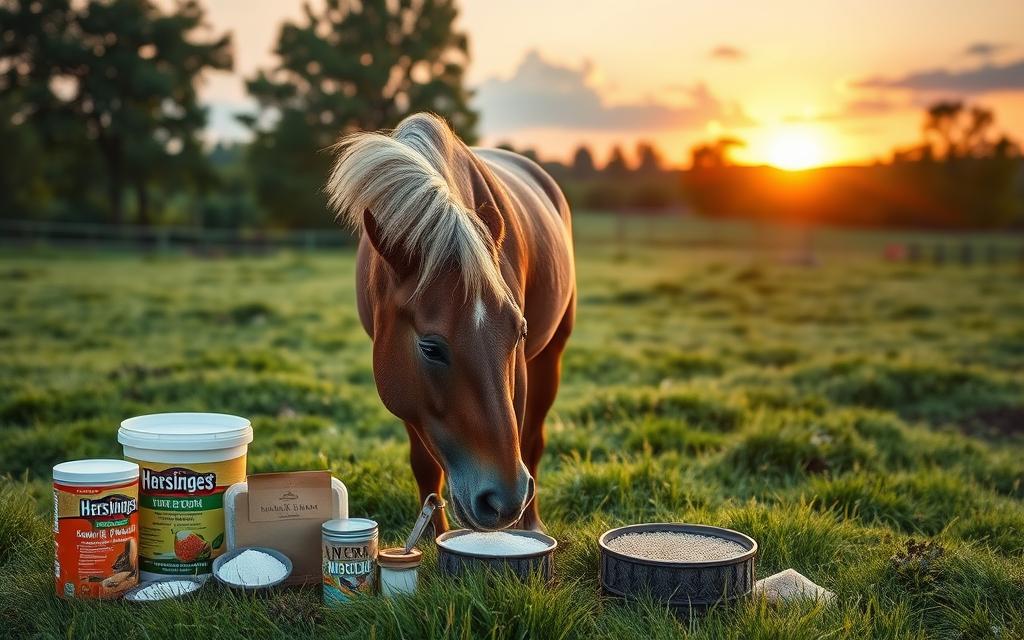
Trail Riding Training and Preparation
Preparing trail horses for riding is all about safety and performance. We need to train them well for different terrains. This training should cover several key areas to help them ride confidently.
It’s important to teach them the right behaviors and skills. This way, both the horse and rider can have a great time outdoors.
Essential Training for Trail Horses
Good trail riding starts with well-trained horses. We should focus on a few key areas:
- Ground Manners: Good ground manners are key for safety and control.
- Desensitization: Getting them used to different things like wildlife and sounds is important.
- Rider Cues: Teaching them to listen to verbal and physical cues is crucial for communication.
By focusing on these areas, we make sure our horses are ready for anything. They can handle unexpected situations calmly.
Importance of Trail Riding Trails Familiarity
Getting horses used to trails helps reduce their anxiety. When they know what to expect, they do better on rides. We can help them get used to different trails through gradual exposure and regular practice.
Training them well and making them familiar with trails makes rides better for everyone. It leads to smoother and more enjoyable experiences.
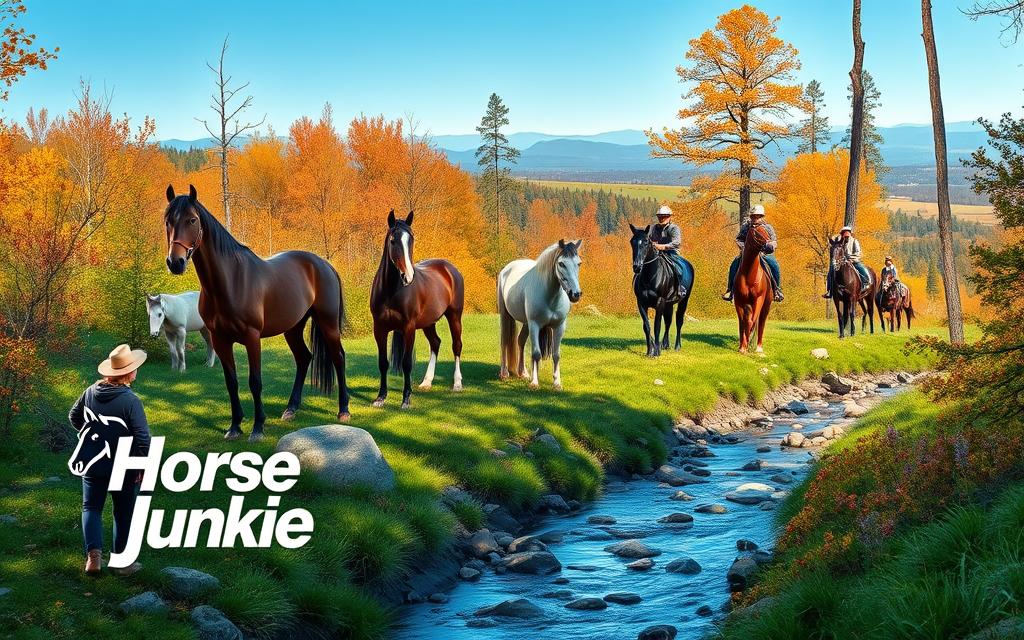
Tack and Equipment for Trail Riding
Choosing the right trail riding tack makes our rides better. The right saddles keep both the horse and rider comfortable on long rides. Knowing which saddles are best for trail horses helps us pick the right one for our adventures.
Appropriate Saddle Choices for Trail Horses
The saddle we choose affects our comfort and control. Here are some key options:
- Western Saddle: It’s comfy and stable, spreading our weight evenly to avoid sore spots.
- English Saddle: It’s light and easy to handle, letting us communicate better with our horse.
- Australian Stock Saddle: It combines the best of both worlds, offering both security and comfort.
- Spanish Saddle: Great for long rides, it’s stable and supportive.
- Argentinian Saddle: Durable and perfect for long trips and working with livestock.
- McClellan Saddle: It’s light and balanced, helping us communicate with our horse on long rides.
Essential Gear for Rider Safety
Our safety gear is just as important as our tack. Here are the must-haves:
- Helmets: Keeping our heads safe is crucial; a helmet that fits well is essential.
- Padded Gloves: They help us grip and stay comfortable, easing hand strain.
- First-Aid Kits: Being prepared with a kit means we’re ready for any small injuries or emergencies.
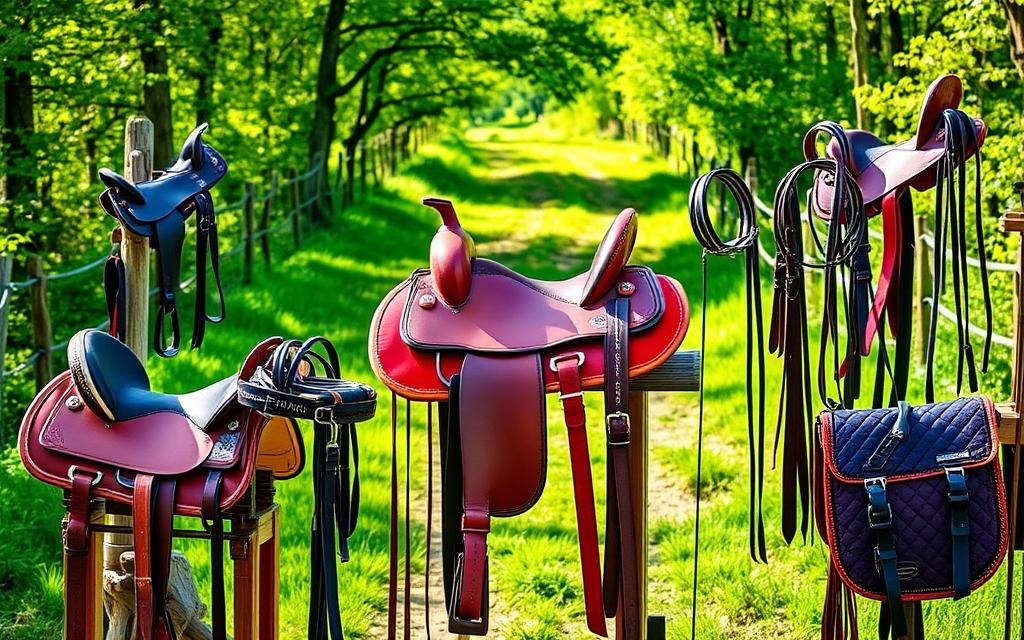
Health and Nutrition Needs of Trail Horses
It’s important to know what trail horses need to stay healthy and perform well. Regular vet visits, hoof care, and daily checks are key. Also, the right nutrition is vital for a great trail ride.
Regular Care for Optimal Performance
Keeping our horses healthy is a big job. They need dental checks, hoof trims, and shots to stay fit. We must watch for any signs of illness or discomfort.
Daily exercise is also crucial. It keeps them ready for long rides.
Nutritional Requirements for Endurance
Our horses need the right food for long rides. They should eat 1.5% to 2% of their body weight in forages each day. This gives them the energy and nutrients they need.
Quality forage and supplements help keep them hydrated and strong. A good diet should include:
- A calcium:phosphorus ratio greater than 1:1, ideally around 1.5:1 for mature horses.
- Daily salt intake ranging from 1.6 to 1.8 g salt/kg of feed dry matter, which can vary with sweat loss.
- Magnesium requirements estimated at 0.015 g/kg body weight for maintenance, increasing to 0.02-0.03 g/kg for working horses.
- Potassium intake of 0.05 g/kg body weight for adult horses to support overall health.
- A dietary copper requirement of 8-10 ppm in total ration, along with iodine and iron, which are easily fulfilled through iodized salt and other sources.
Supplements like Platinum Performance® products can also help. For example, a 1,000 lb horse needs 2 scoops of Platinum Performance® Equine. It costs $77.00 and gives them the nutrients they need for trail riding.
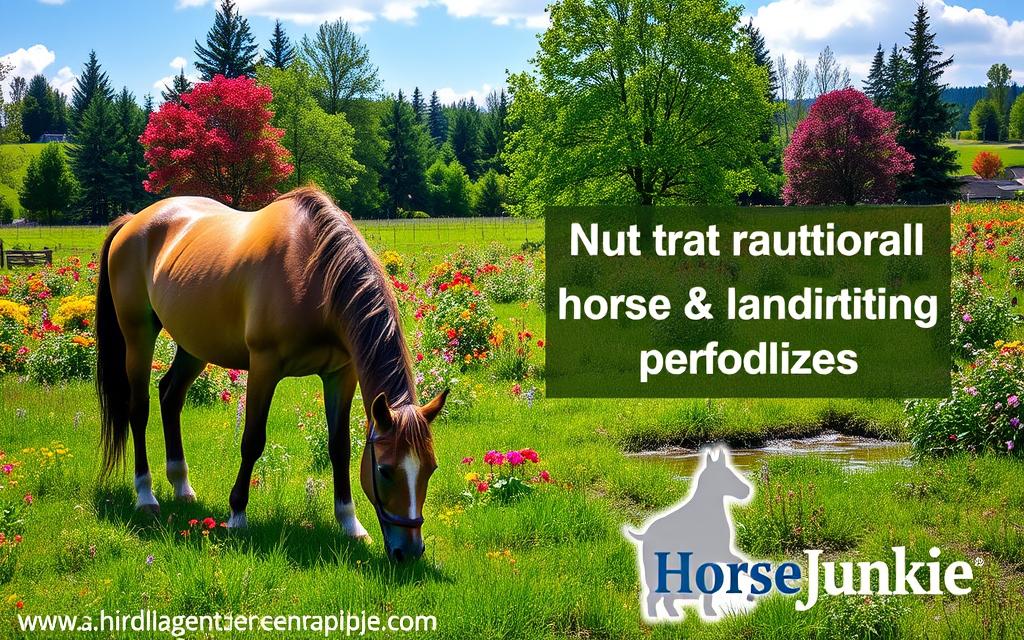
Conclusion: Finding Our Perfect Trail Partner
When searching for the right trail horse, we need to think about our riding style and what we like. We also need to consider the important qualities of our horse. This helps us start our adventures on the right foot.
Next, we should visit good breeders and talk to reliable trainers. We also need to know the costs of owning a horse.
Next Steps for Trail Horse Ownership
After finding horses we like, we should check their personality, age, and training. Horses between 10 to 12 years old are often great for trail riding. They are calm, making our rides safer and more fun.
Looking at different horses can lead us to find the perfect one. This makes choosing a horse both fun and rewarding.
Building a Strong Bond with Our Trail Horse
To connect deeply with our trail horse, we need to groom them regularly and spend quality time together. This helps them feel safe and happy with us. A strong bond means every ride is special and memorable.
FAQ
What are some of the best trail horse breeds available?
Why is it important to choose the right trail horse?
What key factors should we consider when selecting a trail horse?
What characteristics define an ideal trail horse?
How do different terrain types affect our choice of trail horse breeds?
Are there specific breeds that are best for older riders?
What training is essential for trail horses?
What tack is recommended for trail riding?
How can we maintain the health of our trail horses?
What steps should we take if we’re considering trail horse ownership?
Source Links
- The Top 10 Horse Breeds for Beginners
- How to Choose the Right Horse Breed for Your Riding Style | Gladiator Equine
- How to Choose a Good Trail Horse
- Finding your Perfect Trail Horse
- How to Select a Trail Horse – Tips on Finding a horse for trail riding – Five Star Ranch
- 16 Best Horses for Trail Riding [November 2024 Guide]
- What breed was your favorite/best trail horse?
- What Makes a Good Trail Horse?
- What Is The Best Horse For Trail Riding? | Touch of Chrome
- 7 Best Horse Breeds for Trail Riding
- 5 Best Horse Breeds for Rugged Mountain Hunting – Horse Rookie
- Meet the Mighty Clydesdale Horse Breed
- | Horse Factbook
- Best breeds for endurance or competitive trail
- What breed is your trail horse?
- 10 Best Horse Breeds for Trail Riding in Tranquility – Horse Rookie
- Finding your Perfect Trail Horse
- How to Prepare Rider, Horse and Gear for the Trail
- A Guide to the Various Types of Tack for Trail Riding – saddletravel.com | Horse Riding Holidays | Book Live
- Finding your Perfect Trail Horse
- Nutritional Requirements of Horses and Other Equids – Nutritional Requirements of Horses and Other Equids – Merck Veterinary Manual
- Trail Horse | Digestion and Hoof Health | Trail Riding
- Top Picks for Best Trail Horses – Essential Guide
- What’s the Easiest Horse to Ride? | Horse Riding Now
- So, You’re Going on a Trail Ride



